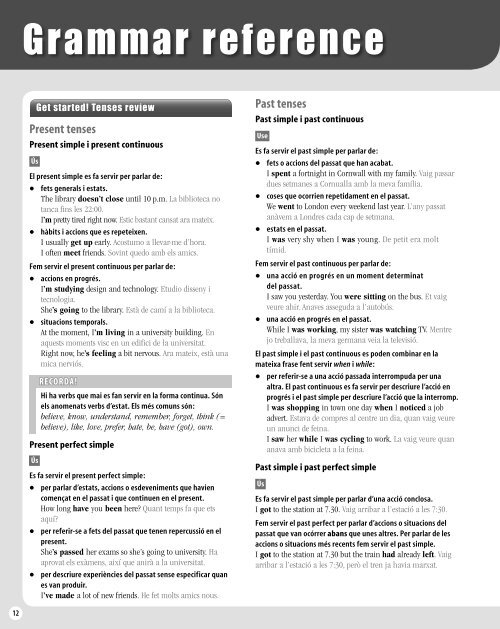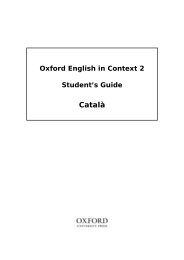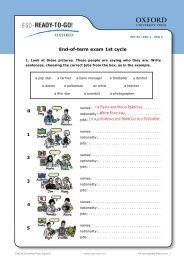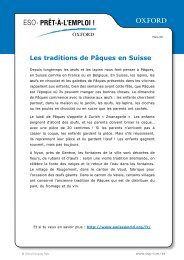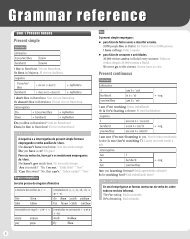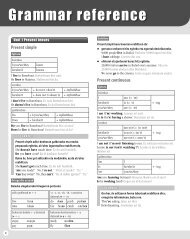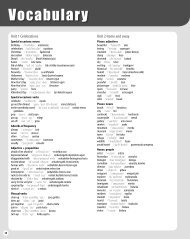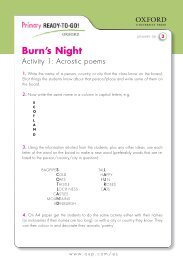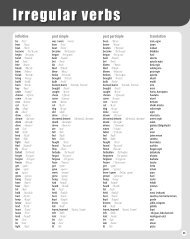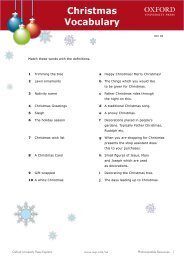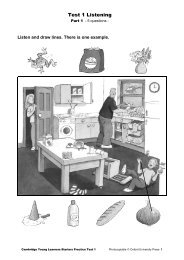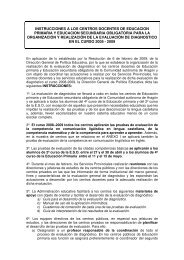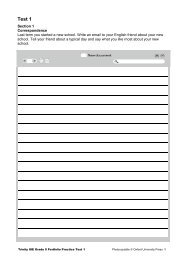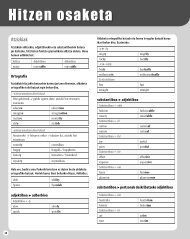cubierta in context catalan 2.indd - Oxford University Press
cubierta in context catalan 2.indd - Oxford University Press
cubierta in context catalan 2.indd - Oxford University Press
You also want an ePaper? Increase the reach of your titles
YUMPU automatically turns print PDFs into web optimized ePapers that Google loves.
12<br />
Grammar reference<br />
Get started! Tenses review<br />
Present tenses<br />
Present simple i present cont<strong>in</strong>uous<br />
Ús<br />
El present simple es fa servir per parlar de:<br />
fets generals i estats.<br />
The library doesn’t close until 10 p.m. La biblioteca no<br />
tanca f<strong>in</strong>s les 22:00.<br />
I’m pretty tired right now. Estic bastant cansat ara mateix.<br />
hàbits i accions que es repeteixen.<br />
I usually get up early. Acostumo a llevar-me d’hora.<br />
I often meet friends. Sov<strong>in</strong>t quedo amb els amics.<br />
Fem servir el present cont<strong>in</strong>uous per parlar de:<br />
accions en progrés.<br />
I’m study<strong>in</strong>g design and technology. Etudio disseny i<br />
tecnologia.<br />
She’s go<strong>in</strong>g to the library. Està de camí a la biblioteca.<br />
situacions temporals.<br />
At the moment, I’m liv<strong>in</strong>g <strong>in</strong> a university build<strong>in</strong>g. En<br />
aquests moments visc en un edifici de la universitat.<br />
Right now, he’s feel<strong>in</strong>g a bit nervous. Ara mateix, està una<br />
mica nerviós.<br />
RECORDA!<br />
Hi ha verbs que mai es fan servir en la forma cont<strong>in</strong>ua. Són<br />
els anomenats verbs d’estat. Els més comuns són:<br />
believe, know, understand, remember, forget, th<strong>in</strong>k (=<br />
believe), like, love, prefer, hate, be, have (got), own.<br />
Present perfect simple<br />
Ús<br />
Es fa servir el present perfect simple:<br />
per parlar d’estats, accions o esdeveniments que havien<br />
començat en el passat i que cont<strong>in</strong>uen en el present.<br />
How long have you been here? Quant temps fa que ets<br />
aquí?<br />
per referir-se a fets del passat que tenen repercussió en el<br />
present.<br />
She’s passed her exams so she’s go<strong>in</strong>g to university. Ha<br />
aprovat els exàmens, així que anirà a la universitat.<br />
per descriure experiències del passat sense especificar quan<br />
es van produir.<br />
I’ve made a lot of new friends. He fet molts amics nous.<br />
Past tenses<br />
Past simple i past cont<strong>in</strong>uous<br />
Use<br />
Es fa servir el past simple per parlar de:<br />
fets o accions del passat que han acabat.<br />
I spent a fortnight <strong>in</strong> Cornwall with my family. Vaig passar<br />
dues setmanes a Cornualla amb la meva família.<br />
coses que ocorrien repetidament en el passat.<br />
We went to London every weekend last year. L’any passat<br />
anàvem a Londres cada cap de setmana.<br />
estats en el passat.<br />
I was very shy when I was young. De petit era molt<br />
tímid.<br />
Fem servir el past cont<strong>in</strong>uous per parlar de:<br />
una acció en progrés en un moment determ<strong>in</strong>at<br />
del passat.<br />
I saw you yesterday. You were sitt<strong>in</strong>g on the bus. Et vaig<br />
veure ahir. Anaves asseguda a l’autobús.<br />
una acció en progrés en el passat.<br />
While I was work<strong>in</strong>g, my sister was watch<strong>in</strong>g TV. Mentre<br />
jo treballava, la meva germana veia la televisió.<br />
El past simple i el past cont<strong>in</strong>uous es poden comb<strong>in</strong>ar en la<br />
mateixa frase fent servir when i while:<br />
per referir-se a una acció passada <strong>in</strong>terrompuda per una<br />
altra. El past cont<strong>in</strong>uous es fa servir per descriure l’acció en<br />
progrés i el past simple per descriure l’acció que la <strong>in</strong>terromp.<br />
I was shopp<strong>in</strong>g <strong>in</strong> town one day when I noticed a job<br />
advert. Estava de compres al centre un dia, quan vaig veure<br />
un anunci de fe<strong>in</strong>a.<br />
I saw her while I was cycl<strong>in</strong>g to work. La vaig veure quan<br />
anava amb bicicleta a la fe<strong>in</strong>a.<br />
Past simple i past perfect simple<br />
Ús<br />
Es fa servir el past simple per parlar d’una acció conclosa.<br />
I got to the station at 7.30. Vaig arribar a l’estació a les 7:30.<br />
Fem servir el past perfect per parlar d’accions o situacions del<br />
passat que van ocórrer abans que unes altres. Per parlar de les<br />
accions o situacions més recents fem servir el past simple.<br />
I got to the station at 7.30 but the tra<strong>in</strong> had already left. Vaig<br />
arribar a l’estació a les 7:30, però el tren ja havia marxat.
Grammar reference<br />
Es fa servir for i s<strong>in</strong>ce amb el past perfect per <strong>in</strong>dicar la durada<br />
d’una acció o d’una situació del passat. For i s<strong>in</strong>ce mai es fan<br />
servir amb temps verbals simples.<br />
I’d known her for years. Feia anys que la coneixia.<br />
He’d worked there s<strong>in</strong>ce March. Hi treballava des del març.<br />
Past simple i present perfect simple<br />
Ús<br />
Fem servir el past simple per parlar d’un estat o d’una acció<br />
que ha acabat.<br />
I worked <strong>in</strong> London last summer. (I don’t work <strong>in</strong> London<br />
now.) L’estiu passat treballava a Londres. (Ja no hi treballo.)<br />
El present perfect simple es fa servir per parlar d’un estat<br />
o d’una acció que va començar en el passat i que cont<strong>in</strong>ua en el<br />
present.<br />
I’ve worked <strong>in</strong> London s<strong>in</strong>ce 2004. (I still work <strong>in</strong> London.)<br />
Treballo a Londres des del 2004. (Encara treballo a Londres.)<br />
Fem servir el past simple quan expressem el moment o l’època<br />
en que va ocórrer una cosa. Especifiquem el moment fent servir<br />
una expressió de temps (ago, then, when, for two days, <strong>in</strong> 2006,<br />
etc.).<br />
I f<strong>in</strong>ished my project last weekend. Vaig acabar el projecte el<br />
cap de setmana passat.<br />
Fem servir el present perfect simple quan no especifiquem el<br />
moment en què va ocórrer una cosa. Fem servir adverbis de<br />
temps per mostrar el v<strong>in</strong>cle entre el passat i el present (never,<br />
ever, already, just, yet, for, s<strong>in</strong>ce).<br />
Have you already f<strong>in</strong>ished your project? (It doesn’t matter<br />
when.) Has acabat el projecte? (Tan s’hi val quan.)<br />
used to<br />
Estructura<br />
afi rmativa<br />
I/he/she/it/you/we/they + used to + <strong>in</strong>f<strong>in</strong>itive<br />
She used to love eat<strong>in</strong>g sweets. Abans li encantava menjar<br />
caramels.<br />
negativa<br />
I/he/she/it/you/we/they + didn’t use to + <strong>in</strong>f<strong>in</strong>itive<br />
I didn’t use to like coffee. Abans no m’agradava el cafè.<br />
<strong>in</strong>terrogativa<br />
Did + I/he/she/it/you/we/they + use to + <strong>in</strong>f<strong>in</strong>itive<br />
Did you use to live here? Vivies abans aquí?<br />
Ús<br />
used to es fa servir per contrastar un costum o una situació del<br />
passat amb una altra del present. Fem servir used to per expressar<br />
que aquest costum o aquesta situació ja no s’esdevé en el present.<br />
She used to go to our college. (but she doesn’t go to our<br />
college now) Anava al nostre col·legi. (però ja no hi va)<br />
I didn’t use to have an MP3 player. (but now I do) Abans no<br />
tenia un reproductor d’MP3. (però ara sí)<br />
RECORDA!<br />
per parlar d’un costum del passat també podem fer servir<br />
would + <strong>in</strong>f<strong>in</strong>itiu.<br />
When she was little, she would play here all day long.<br />
Quan era petita jugava aquí tot el dia.<br />
però no es pot fer servir would + <strong>in</strong>f<strong>in</strong>itiu per parlar d’un<br />
estat passat.<br />
When she was little, she would have a pet rabbit.<br />
Workbook extension: be / get used to<br />
Estructura<br />
be used to es forma amb be + used to + -<strong>in</strong>g<br />
I’m used to gett<strong>in</strong>g up early. Estic acostumada a llevar-me<br />
d’hora.<br />
get used to es forma fent servir get + used to + -<strong>in</strong>g<br />
He got used to walk<strong>in</strong>g everywhere. Es va acostumar a<br />
cam<strong>in</strong>ar a tot arreu.<br />
be i get poden fer-se servir en dist<strong>in</strong>ts temps verbals, però used<br />
to mai no varia.<br />
Ús<br />
be used to significa “estar acostumat a”<br />
get used to significa “acostumar-se a”<br />
RECORDA!<br />
No confonguis be used to i get used to amb used to. Tenen<br />
significats i estructures diferents.<br />
13
14<br />
Grammar reference<br />
Future forms<br />
will<br />
Fem servir will:<br />
per fer prediccions o donar op<strong>in</strong>ions sobre el futur.<br />
It will be hot this summer. Aquest estiu farà calor.<br />
I th<strong>in</strong>k the holiday will be great. Crec que les vacances<br />
seran fantàstiques.<br />
per expressar decisions preses en aquest moment.<br />
‘I can’t afford to go out for lunch.’ ‘I’ll pay for you.’ “No<br />
puc permetre’m d<strong>in</strong>ar fora.” “Jo t’hi convido!”<br />
I th<strong>in</strong>k I’ll read this book. Crec que llegiré aquest llibre.<br />
go<strong>in</strong>g to<br />
Fem servir go<strong>in</strong>g to:<br />
per parlar sobre els nostres plans i les nostres <strong>in</strong>tencions.<br />
What are you go<strong>in</strong>g to do <strong>in</strong> the Christmas holidays? Què<br />
faràs a les vacances de Nadal?<br />
I’m go<strong>in</strong>g to see Shakira at the Arena tonight. Aquesta nit<br />
aniré a veure un concert de Shakira a l’Arena.<br />
per fer prediccions basades en l’evidència del moment en què<br />
es parla.<br />
The sky is clear. The weather is go<strong>in</strong>g to be nice. El cel està<br />
serè. Farà bon temps.<br />
The bus still hasn’t arrived. We’re go<strong>in</strong>g to be late! Encara<br />
no ha arribat l’autobús. Hi arribarem tard!<br />
Present cont<strong>in</strong>uous per expressar futur<br />
Fem servir el present cont<strong>in</strong>uous per parlar de plans a curt<br />
term<strong>in</strong>i. Se sol <strong>in</strong>dicar l’hora o el lloc.<br />
We are go<strong>in</strong>g to Rome <strong>in</strong> May. Al maig anirem a Roma.<br />
I’m cook<strong>in</strong>g tonight. Aquesta nit cu<strong>in</strong>o jo.<br />
Future cont<strong>in</strong>uous<br />
Estructura<br />
afi rmativa<br />
I/he/she/it/we/you/they + will + be + -<strong>in</strong>g<br />
I’ll be mov<strong>in</strong>g to England. Em mudaré a Anglaterra.<br />
negativa<br />
I/he/she/it/we/you/they + won’t + be + -<strong>in</strong>g<br />
I won’t be revis<strong>in</strong>g tonight. Aquesta nit no repassaré.<br />
<strong>in</strong>terrogativa<br />
Will I/he/she/it/we/you/they + be + -<strong>in</strong>g<br />
Will they be com<strong>in</strong>g to the party? V<strong>in</strong>dran a la festa?<br />
Ús<br />
Fem servir el future cont<strong>in</strong>uous per referir-nos a<br />
accions futures:<br />
que ocorreran durant un període de temps.<br />
I can’t meet you tomorrow – I’ll be visit<strong>in</strong>g my<br />
grandmother. No puc quedar amb tu demà. Estaré visitant<br />
la meva àvia.<br />
planejades amb anterioritat.<br />
We’ll be leav<strong>in</strong>g on the day after Christmas. Marxem<br />
l’endemà de Nadal.<br />
Future perfect simple<br />
Estructura<br />
afi rmativa<br />
I/he/she/it/we/<br />
you/they<br />
+ will + have + past participle<br />
I’ll have been here for six hours. Ja deu fer sis hores que sóc<br />
aquí.<br />
negativa<br />
I/he/she/it/we/<br />
you/they<br />
+won’t + have + past participle<br />
She won’t have arrived yet. Encara no hi deu haver arribat.<br />
<strong>in</strong>terrogativa<br />
Will<br />
+ I/he/she/it/we/you/<br />
they<br />
+ have + past participle<br />
Will you have f<strong>in</strong>ished by midday? Hauràs acabat a migdia?<br />
Ús<br />
Fem servir el future perfect per parlar d’alguna cosa que haurà<br />
acabat en un moment determ<strong>in</strong>at del futur. Normalment fem<br />
servir by per <strong>in</strong>dicar aquest moment.<br />
We’ll have learnt how to ski perfectly by the end of the<br />
holiday. Quan acab<strong>in</strong> les vacances, haurem après a esquiar<br />
perfectament.<br />
I’ll have passed all my exams by this time next year. L’any<br />
que ve, per aquestes dates, hauré aprovat tots els exàmens.
Grammar reference<br />
Question forms<br />
L’ordre de les paraules en les preguntes<br />
Per formular preguntes amb verbs en present simple o en past<br />
simple, se sol fer servir l’ auxiliar do / does<br />
Do you come here often? Hi véns sov<strong>in</strong>t?<br />
When did he go to Cornwall? Quan se va anar a Cornualla?<br />
No es fa servir do /does amb els verbs be, have got ni amb verbs<br />
modals. Al seu lloc, es posa be, have o el verb modal abans<br />
del subjecte.<br />
Is she a student? És estudiant?<br />
Have you got a mirror? Tens un mirall?<br />
Can I help you? T’hi puc ajudar?<br />
No es fa servir do /does amb les formes contínues ni amb go<strong>in</strong>g to.<br />
Is he teach<strong>in</strong>g this class? Fa ell aquesta classe?<br />
Will you be go<strong>in</strong>g on holiday this summer? Aniràs de vacances<br />
aquest estiu?<br />
Are you go<strong>in</strong>g shopp<strong>in</strong>g later? Te’n vas després de compres?<br />
Preguntes amb Wh- i How<br />
Per formular preguntes fem servir unes paraules determ<strong>in</strong>ades<br />
(how, what, when, where, which, who, whom, why).<br />
When did you arrive? Quan has arribat?<br />
What time is it? Qu<strong>in</strong>a hora és?<br />
How will we get there? Com hi arribarem?<br />
Unit 1 Relative clauses<br />
Relative pronouns<br />
that, which, when, where, who, whose<br />
Per afegir una oració nova a una frase, es pot fer servir un<br />
pronom relatiu. Es fa servir un pronom relatiu que faci referència<br />
al nom que va abans de l’oració de relatiu.<br />
You’re the person who gets the highest marks.<br />
Ets la persona que treu les notes més altes.<br />
Fem servir who i that per referir-nos a les persones.<br />
The girl who / that works at the library is very friendly. La noia<br />
que treballa a la biblioteca és molt simpàtica.<br />
També es pot fer servir whom per referir-se a la gent, però<br />
només en un llenguatge molt formal, i només quan la persona és<br />
el complement directe de la frase. Whom se sol fer servir només<br />
en situacions molt formals.<br />
The young lady whom I met at the library was most helpful.<br />
La noia que vaig conèixer a la biblioteca em va ajudar molt.<br />
(formal)<br />
The girl (who / that) I met at the library was really helpful. La<br />
noia que vaig conèixer a la biblioteca em va ajudar molt.<br />
(<strong>in</strong>formal)<br />
Es fa servir which i that per referir-se a les coses.<br />
I’m revis<strong>in</strong>g the language which / that we studied last week.<br />
Estic repassant el llenguatge que vam estudiar la setmana<br />
passada.<br />
School is a place which / that gives you an education. El<br />
col·legi és un lloc que et proporciona una educació.<br />
Es fa servir when per referir-se al temps.<br />
There are times when my m<strong>in</strong>d goes completely blank dur<strong>in</strong>g<br />
his lessons. Hi ha moments durant les seves classes en què la<br />
ment se’m queda completament en blanc.<br />
Es fa servir where per referir-se a espais i llocs.<br />
You need to f<strong>in</strong>d a room where you can study properly.<br />
Necessites trobar una habitació on puguis estudiar bé.<br />
School is the place (where) I was happiest. El col·legi és el lloc<br />
on vaig ser més feliç.<br />
Es fa servir whose per parlar de pert<strong>in</strong>ença.<br />
There isn’t anyone <strong>in</strong> the class whose marks are worse than<br />
m<strong>in</strong>e. No hi ha n<strong>in</strong>gú en la classe les notes del qual sigu<strong>in</strong> més<br />
dolentes que les meves.<br />
15
16<br />
Grammar reference<br />
who’s and whose<br />
No s’han de confondre who’s i whose en les oracions de relatiu.<br />
Whose és un pronom relatiu que fa referència a la pert<strong>in</strong>ença.<br />
He’s the person whose achievements I admire the most. Ell és<br />
la persona els èxits de la qual admiro més.<br />
Who’s és la contracció de who is o who has.<br />
He’s the one who’s very <strong>in</strong>telligent. (who is) Ell és el que és<br />
molt <strong>in</strong>tel·ligent.<br />
He’s the boy who’s lived <strong>in</strong> Kosovo. (who has) Ell és el noi que<br />
ha viscut a Kosovo.<br />
Omission of relative pronouns<br />
Podem ometre el pronom relatiu quan es tracta del complement<br />
directe de l’oració.<br />
That’s the film (that / which) we saw. Aquesta és la pel·lícula<br />
que vam veure.<br />
He’s the teacher (that / who) I can’t stand. Aquest és el<br />
professor que no suporto.<br />
Se solen ometre els pronoms relatius that, which i who en el<br />
llenguatge oral.<br />
RECORDA!<br />
El pronom whose no es pot ometre.<br />
Def<strong>in</strong><strong>in</strong>g relative clauses<br />
Oracions especificatives<br />
Les oracions especificatives proporcionen <strong>in</strong>formació essencial<br />
sobre el nom que acompanyen. Sense l’oració especificativa, la<br />
frase quedaria <strong>in</strong>completa i no t<strong>in</strong>dria sentit.<br />
She’s the teacher.<br />
Aquesta frase està <strong>in</strong>completa; necessita una oració especificativa.<br />
She’s the teacher. She’s the teacher who gave <strong>in</strong>terest<strong>in</strong>g<br />
lessons. És la professora. És la professora que feia classes<br />
<strong>in</strong>teressants.<br />
Maths is the subject. Maths is the subject that gives me<br />
most problems. Matemàtiques és l’assignatura.<br />
Matemàtiques és l’assignatura que més problemes em dóna.<br />
I never understand any explanations. I never understand<br />
any explanations which Mr Mitchell gives. No entenc mai les<br />
explicacions. No entenc mai les explicacions que fa el<br />
senyor Mitchell.<br />
Non-def<strong>in</strong><strong>in</strong>g relative clauses<br />
Oracions explicatives<br />
Les oracions explicatives donen <strong>in</strong>formació que no és essencial<br />
sobre el nom que acompanyen. Sense l’oració explicativa, la<br />
frase cont<strong>in</strong>ua ten<strong>in</strong>t sentit.<br />
Walter Turnbull has just passed an A-level <strong>in</strong> Catalan. Walter<br />
Turnball acaba de treure un A-level en llengua <strong>catalan</strong>a.<br />
Aquesta frase ja està completa, però podem afegir-hi <strong>in</strong>formació<br />
addicional amb una oració explicativa.<br />
Walter Turnbull, who is 81 years old, has just passed an<br />
A-level <strong>in</strong> Catalan. Walter Turnball, que té 81 anys, acaba de<br />
treure un A-level en llengua <strong>catalan</strong>a.<br />
No podem ometre el pronom relatiu en una oració explicativa.<br />
His teachers at Lancaster College, where he took the exam, are<br />
delighted. Els seus professors de Lancaster College, on va fer<br />
l’examen, estan encantats.<br />
His grades, which are mostly Bs and Cs, are not important to<br />
him. Les seves notes, que sónla majoria B i C, no són<br />
importants per a ell.<br />
Sempre es posen comes per separar l’oració explicativa de la<br />
resta de la frase.<br />
Walter, whose granddaughter Tess also did the exam, now has<br />
39 A-levels! Walter, la néta Tess del qual també va fer l’examen,<br />
ja té 39 A-levels.<br />
My university has a great library, which is a big advantage. La<br />
meva universitat té una biblioteca estupenda, la qual cosa és un<br />
gran avantatge.<br />
Podem comb<strong>in</strong>ar dues frases simples fent servir una oració<br />
explicativa.<br />
Jaume’s sister is called Pilar. She’s a teacher. La germana de<br />
Jaume es diu Pilar. És professora.<br />
Jaume’s sister, who’s a teacher, is called Pilar. La<br />
germana de Jaume, que és professora, es diu Pilar.<br />
O Jaume’s sister, who’s called Pilar, is a teacher. La<br />
germana de Jaume, que es diu Pilar, és professora.<br />
RECORDA!<br />
No es fa servir mai that en una oració explicativa; sempre s’hi<br />
fa servir who o which.<br />
My primary school, which was <strong>in</strong> a village, closed down<br />
recently. NO My primary school, that was <strong>in</strong> a village, closed<br />
down recently. El meu col·legi, que estava en un poble, va<br />
tancar fa poc temps.<br />
The student, who was brilliant with computers, set up her own<br />
bus<strong>in</strong>ess. NO The student, that was brilliant with computers, set<br />
up her own bus<strong>in</strong>ess. L’alumna, a la qual li anaven molt bé els<br />
ord<strong>in</strong>adors, va muntar el seu propi negoci.
Grammar reference<br />
Unit 2 Modal verbs<br />
Modal verbs: general po<strong>in</strong>ts<br />
Els verbs modals són verbs amb característiques especials.<br />
Acompanyen el verb pr<strong>in</strong>cipal per afegir uns matisos determ<strong>in</strong>ats<br />
a la frase, per exemple, obligació o consell.<br />
Estructura<br />
Els verbs modals tenen les característiques següents:<br />
Gairebé tots van seguits d’un <strong>in</strong>f<strong>in</strong>itiu sense to (tret de<br />
ought to).<br />
I must look for my passport. He de buscar el passaport.<br />
She should go to the doctor’s. Hauria d’anar a cal metge.<br />
Però I ought to call my friend. Hauria de telefonar al meu<br />
amic.<br />
En els verbs modals, la tercera persona no duu -s.<br />
I can speak English. Parlo anglès.<br />
He can speak English. Ell parla anglès.<br />
En els verbs modals no es fa servir el verb auxiliar<br />
do / does en la forma negativa o <strong>in</strong>terrogativa, ni per a les<br />
respostas curtes.<br />
She shouldn’t work so hard. No hauria de treballat tant.<br />
‘Can you drive?’ ‘Yes, I can.’ “Saps conduir?” “Sí.”<br />
You couldn’t do me a favour, could you? Et faria res fer-me<br />
un favor?<br />
We needn’t pay this bill until next month. No hem de pagar<br />
aquesta factura f<strong>in</strong>s al mes que ve.<br />
En els verbs modals es poden fer servir contraccions en<br />
frases negatives.<br />
We should not spend so much money. We shouldn’t<br />
spend so much money. No hauríem de gastar tants d<strong>in</strong>ers.<br />
Els verbs modals només tenen una forma. Per tant, per<br />
expressar diferents temps, de vegades cal fer servir altre<br />
verbs amb significats similars.<br />
He might take a gap year next year. They thought he<br />
was probably go<strong>in</strong>g to take a gap year.<br />
Potser s’agafi un any sabàtic l’any que ve. Van pensar<br />
que probablement s’afagaria un any sabàtic.<br />
Ús<br />
Molts verbs modals tenen diferents significats depenent del<br />
<strong>context</strong>.<br />
Modals of advice, necessity, obligation and<br />
prohibition<br />
must, have to, need<br />
Es fa servir must i have to (que no és un verb modal), per<br />
expressar obligació.<br />
You must arrive on time. Has de ser puntual.<br />
You have to look good on a date. Has d’anar endreçat a<br />
una cita.<br />
Es fa servir needn’t i don’t have to, que no són verbs modals, quan<br />
no hi ha obligació.<br />
You needn’t pay for everyth<strong>in</strong>g on a date. No cal que ho pagues<br />
tot en una cita.<br />
We don’t have to see each other every weekend. No cal que ens<br />
vegem cada cap de setmana.<br />
El verb need (sense to) només es fa servir en frases negatives<br />
i <strong>in</strong>terrogatives. En les afirmatives, es fa servir need to per<br />
expressar necessitat.<br />
You needn’t call me later. No cal que em telefonis més tard.<br />
I need to buy my boyfriend a present today. NO I need buy my<br />
boyfriend a present today. He de comprar un regal per al meu<br />
nuvi avui.<br />
Es fa servir mustn’t per expressar prohibició.<br />
You mustn’t cheat on your boy or girlfriend. No has d’enganyar<br />
el teu nuvi o la teva núvia.<br />
RECORDA!<br />
Tracta de no confondre must i don’t have to. Els significats<br />
són similars en la forma afirmativa, però completament<br />
diferents en la negativa. Es fa servir mustn’t per expressar<br />
una prohibició rotunda, i don’t have to quan no hi ha<br />
obligació.<br />
You have to call me this afternoon. (= You must r<strong>in</strong>g me.)<br />
M’has de telefonar aquesta tarda.<br />
You mustn’t call me this afternoon. (= Don’t call me.) No<br />
m’has de telefonar aquesta tarda.<br />
You don’t have to call me this afternoon. (= It isn’t<br />
necessary to call me.) No cal que em telefonis aquesta tarda.<br />
17
18<br />
Grammar reference<br />
ought to, should<br />
Es fa servir ought to i should / shouldn’t per donar consells i fer<br />
recomanacions.<br />
You ought to dress smartly. Hauries d’anar ben vestit.<br />
You should arrive on time. Hauries de ser puntual.<br />
had better<br />
Es fa servir had better + <strong>in</strong>f<strong>in</strong>itiu per donar consells o expressar<br />
una <strong>in</strong>tenció. Té un significat similar a ought to i should.<br />
You’d better apologize to her. Hauries de demanar-li perdó.<br />
La negativa es forma afeg<strong>in</strong>t-hi not davant del verb pr<strong>in</strong>cipal.<br />
I feel terrible! I’d better not go out. Em trobo fatal! No hauria<br />
de sortir.<br />
Podem fer servir had better (not) per amenaçar.<br />
You’d better not be late, or I’ll be furious! Val més que no hi<br />
arribis tard, o m’enfadaré molt!<br />
Modals of ability and permission<br />
can, could, be able to, be allowed to<br />
Es fa servir el verb modal can per expressar el que un sap o pot<br />
fer en el present.<br />
My boyfriend can ride a motorbike. El meu nuvi sap conduir<br />
una moto.<br />
I can’t hear you. NO I don’t hear you. No et sento.<br />
Fem servir el verb modal could per expressar el que un podia o no<br />
podia fer en el passat.<br />
I couldn’t drive last week, but I can now! La setmana passada<br />
no podia conduir, però ara sí!<br />
It was so dark I couldn’t see anyth<strong>in</strong>g. NO It was so dark I<br />
didn’t see anyth<strong>in</strong>g. Estava tan fosc que no veia res.<br />
Com que no es poden fer servir can i could en tots els temps, fem<br />
servir be able to (que no és un verb modal) per a uns altres temps<br />
verbals.<br />
Soon Peter will be able to speak Catalan fluently. Aviat Peter<br />
sabrá parlar català amb fluïdesa.<br />
People have been able to talk to each other <strong>in</strong> <strong>in</strong>ternet chat<br />
rooms s<strong>in</strong>ce 1988. La gent pot parlar per Internet en xats des del<br />
1988.<br />
Es fa servir el verb modal can per expressar permís en el present.<br />
Can we go? Podem anar-hi?<br />
I can’t stay out after midnight. He de ser a casa abans de<br />
mitjanit.<br />
Com que can no es pot fer servir en tots els temps, fem servir be<br />
allowed to (que no és un verb modal) per expressar permís en<br />
uns altres temps.<br />
I won’t be allowed to go to the Coldplay concert next<br />
weekend. No em deixaran anar al concert de Coldplay el cap de<br />
setmana que ve.<br />
You were allowed to stay out late last Saturday. Et van deixar<br />
quedar-te f<strong>in</strong>s ben tard dissabte passat.<br />
També podem fer servir could per expressar permís general en el<br />
passat. Tanmateix, could no es pot fer servir per expressar permís<br />
per a una acció del passat en particular. Al seu lloc, fem servir la<br />
forma corresponent de be allowed to.<br />
When she was little she could watch cartoons whenever she<br />
wanted to. De petita, podia veure dibuixos animats quan volia.<br />
(permís en general)<br />
Yesterday even<strong>in</strong>g, she was allowed to watch a cartoon. NO<br />
Yesterday even<strong>in</strong>g she could watch a cartoon. Ahir al vespre la<br />
van deixar veure dibuixos animats. (permís per a una acció del<br />
passat en particular)<br />
Modals of possibility and certa<strong>in</strong>ty<br />
may, might, can, could, must<br />
Es fa servir may, may not, might, might not i could per parlar de<br />
possibilitat en el present o en el futur.<br />
My date with Ben could be a disaster. NO My date with Ben can<br />
be a disaster. La meua cita amb Ben podria ser un desastre.<br />
We might have noth<strong>in</strong>g <strong>in</strong> common. Potser no t<strong>in</strong>guem res en<br />
comú.<br />
They could be on the tra<strong>in</strong> now. Potser siguen al tren ara.<br />
You may get on really well. Pot ser que us porteu bé.<br />
Fem servir can’t quan creem o imag<strong>in</strong>em que una cosa<br />
és impossible.<br />
He can’t be bor<strong>in</strong>g – he’s <strong>in</strong> a band! És impossible que sigui<br />
avorrit, està en un grup de música!<br />
Fem servir must quan estem segurs d’una cosa.<br />
He must be a nice person if he’s Jeff’s friend. Ha de ser bona<br />
persona si és amic de Jeff.<br />
Es fa servir must i can’t per fer deduccions lògiques.<br />
That must be his brother – they look alike. Aquest deu ser el<br />
seu germà; s’assemblen.<br />
L<strong>in</strong>da can’t be at home because she didn’t answer the phone. És<br />
impossible que L<strong>in</strong>da siga a casa, perquè no agafava el telèfon.
Grammar reference<br />
Modals + perfect <strong>in</strong>f<strong>in</strong>itives<br />
Es poden fer servir alguns verbs modals amb have + participi<br />
passat per referir-se a esdeveniments passats.<br />
can’t have + participio passat<br />
Fem servir can’t have + participi passat per expressar una<br />
impossibilitat en el passat.<br />
I can’t have made a good impression because he hasn’t<br />
phoned. No dec haver-li causat bona impressió, perquè no m’ha<br />
telefonat.<br />
She can’t have liked me very much because she never called!<br />
No li vaig deure agradar molt, merquè mai no m’ha telefonat.<br />
could have + participio passat<br />
Es fa servir could have + participi passat per expressar una cosa<br />
que podria haver ocorregut en el passat, encara que ja sigui<br />
massa tard.<br />
You could have told me that Jo fancied my sister. Em podries<br />
haver dit que a Jo li agradava la meua germana.<br />
We could have <strong>in</strong>vited her to the party, but we all forgot. La<br />
podríem haver <strong>in</strong>vitat a la festa, però se’ns va oblidar a tots.<br />
could / may / might have + participio passat<br />
Es fa servir might, may o could have + participi passat per<br />
expressar el que ha pogut ocórrer en el passat.<br />
They might / may / could have broken up. Potser hag<strong>in</strong><br />
trencat.<br />
He might / may / could / have phoned. Pot ser que hagi<br />
telefonat.<br />
must have + participio passat<br />
Fem servir must have + participi passat per expressar certesa o<br />
fer una deducció lógica sobre el passat.<br />
She must have known that I fancied Ben – it was obvious!<br />
Havia de saber que m’agradava Ben, era obvi!<br />
He must have felt terrible when he saw how upset she was.<br />
Degué sentir-se fatal en veure com de malament que estava.<br />
should have + participio passat<br />
Fem servir should have + participi passat per expressar una<br />
op<strong>in</strong>ió sobre esdeveniments passats, encara que ja sigui massa<br />
tard.<br />
Rachel should have left after ten m<strong>in</strong>utes but she stayed the<br />
whole even<strong>in</strong>g. Rachel hauria d’haver marxat al cap de deu<br />
m<strong>in</strong>uts, però s’hi va quedar tota la tarda.<br />
I was worried – he should have called me. Estava<br />
preocupada; hauria d’haver-me telefonat.<br />
shouldn’t have + participio passat<br />
Fem servir shouldn’t have + participi passat per expressar<br />
penediment o crítica d’esdeveniments passats.<br />
I shouldn’t have taken Rachel to the café. No hauria haver<br />
dut Rachel a la cafeteria.<br />
You shouldn’t have lied to me. No hauries d’haver-me mentit.<br />
Unit 3 Complex clauses and l<strong>in</strong>kers<br />
Complex clauses<br />
Les oracions complexes ens proporcionen <strong>in</strong>formació addicional<br />
sobre una frase i s’<strong>in</strong>trodueixen mitjançant mots o frases d’enllaç,<br />
com ara although, so that, etc. Aquests mots i frases es coneixen<br />
com a l<strong>in</strong>kers connectors . Les oracions complexes poden tener<br />
dist<strong>in</strong>ts significats depenent del connector que s’hi faci servir:<br />
contrast. S’hi fan servir connectors com: although, though, <strong>in</strong><br />
spite of the fact that, despite the fact that<br />
propòsit. S’hi fan servir connectors com: so that<br />
raó. S’hi fan servir connectors com: because, as, s<strong>in</strong>ce<br />
conseqüència. S’hi fan servir connectors com: so … that, such<br />
… that<br />
RECORDA!<br />
Quan l’oració complexa va al començament de la frase, es<br />
posa una coma per separar les dues oracions:<br />
He still did the bungee jump although he was scared. Va fer<br />
salt de pont malgrat que li feia por.<br />
Però Although he was scared, he still did the bungee jump.<br />
Malgrat fer-li por, va fer salt de pont.<br />
L<strong>in</strong>kers of contrast<br />
Fem servir els connectors següents per expressar contrast:<br />
although, though, despite, despite the fact that, <strong>in</strong> spite of, <strong>in</strong> spite<br />
of the fact that. Aquest connectors es fan servir de la manera<br />
següent:<br />
although / though + oració. Although i though tenen el mateix<br />
significat, però though es més normal en l’anglès <strong>in</strong>formal.<br />
So far James has visited five countries, although he has<br />
only spent ten euros! F<strong>in</strong>s ara James ha visitat c<strong>in</strong>c<br />
països, tot i que només s’ha gastat deu euros!<br />
Though the website started recently, James has had lots<br />
of offers. Tot i que la pàg<strong>in</strong>a web es va crear fa poc de<br />
temps, a James li han arribat moltes ofertes.<br />
despite the fact that / <strong>in</strong> spite of the fact that + oració.<br />
We bought the tickets despite the fact that they were<br />
expensive. Vam comprar els bitllets, tot i que eren cars.<br />
In spite of the fact that he has very little money, James<br />
has travelled a lot. Malgrat tenir molts pocs d<strong>in</strong>ers, James ha<br />
viatjat molt.<br />
despite / <strong>in</strong> spite of + nom / pronom o gerundi.<br />
In spite of all the discounts offered by travel agents,<br />
go<strong>in</strong>g on holiday can still be expensive. Malgrat els<br />
descomptes que ofereixen les agències de viatges, anar de<br />
vacances encara pot ser car.<br />
Despite hav<strong>in</strong>g little money, James Beck has found a way<br />
to travel the world for free! NO Despite of hav<strong>in</strong>g little<br />
money ... Malgrat tenir molts pocs d<strong>in</strong>ers, James Beck ha<br />
trobat una manera de viatjar de franc pel món.<br />
19
20<br />
Grammar reference<br />
L<strong>in</strong>kers of purpose and reason<br />
Es poden fer servir els connectors següents per expressar el<br />
propòsit d’una acció: to, <strong>in</strong> order (not) to, so as (not) to, so, to.<br />
to / <strong>in</strong> order (not) to / so as (not) to + <strong>in</strong>f<strong>in</strong>itiu. Tots tenen<br />
el mateix significat, però no es pot fer servir to en la forma<br />
negativa. In order (not) to i so as not to es fan servir sov<strong>in</strong>t en<br />
un anglès més formal.<br />
I hired a car to tour the island. Vaig llogar un cotxe per<br />
recórrer l’illa.<br />
I started the website <strong>in</strong> order to save money. Vaig crear la<br />
pàg<strong>in</strong>a web per estalviar d<strong>in</strong>ers.<br />
He went to Alaska so as to experience someth<strong>in</strong>g new. Va<br />
anar a Alaska per experimentar alguna cosa nova.<br />
He left early <strong>in</strong> order not to miss his flight home NO<br />
He left early not to miss his flight home. Va sortir d’hora per<br />
no perdre el vol a casa.<br />
so / so that + oració. Tenen el mateix significat. Sov<strong>in</strong>t<br />
s’omet la paraula that en l’anglès <strong>in</strong>formal o oral. Aquests<br />
connectors solen fer-se servir amb can / can’t / could / will /<br />
won’t / wouldn’t.<br />
I’d love to go to Alaska so I can have a white Christmas!<br />
M’encantaria anar a Alaska per passar-hi un Nadal blanc.<br />
He took a notebook so that he could write about his<br />
holiday. Es va endur un quadern per poder escriure sobre<br />
les seves vacances.<br />
Podem fer servir els connectors següents per expressar la raó<br />
d’una acció o un esdeveniment: as, because, because of, s<strong>in</strong>ce.<br />
as / because / s<strong>in</strong>ce + oració.<br />
As the flight was cancelled, we stayed an extra night.<br />
Com que van cancel·lar el vol, ens hi vam quedar una nit més.<br />
James started the website because he wanted to travel.<br />
James va crear la pàg<strong>in</strong>a web, perquè volia viatjar.<br />
S<strong>in</strong>ce the weather was bad, we spent the day at the hotel.<br />
Com que feia mal temps, vam passar el dia a l’hotel.<br />
because of + nombre / s<strong>in</strong>tagma nom<strong>in</strong>al.<br />
He couldn’t go jet-ski<strong>in</strong>g because of the bad weather. No<br />
va poder anar amb moto aquàtica perquè feia mal temps.<br />
L<strong>in</strong>kers of result<br />
Podem fer servir els connectors següents per expressar el resultat<br />
o la conseqüència d’alguna cosa: so … that, such … that.<br />
so + adjectiu + oració amb that.<br />
It’s so cold today that I had to borrow a coat. Avui fa<br />
tant de fred que he hagut de demanar prestat un abric.<br />
so + adverbi + oració amb that.<br />
Sometimes the temperature falls so quickly that my<br />
breath freezes <strong>in</strong>stantly. De vegades les temperatures<br />
baixen tan ràpid que se’m congela l’alè <strong>in</strong>stantàniament.<br />
such + a(n) + adjectiu + nom s<strong>in</strong>gular + oració amb that.<br />
It’s such a beautiful country that I’d like to stay. És un<br />
país tan bonic que m’agradaria quedar-m’hi.<br />
such + adjectiu + nom no comptable + oració amb that.<br />
It has such bad weather that it’s often too dangerous<br />
to go out. Fa tan mal temps que sov<strong>in</strong>t és massa perillós<br />
sortir al carrer.<br />
Unit 4 Reported speech<br />
Fem servir l’estil <strong>in</strong>directe per <strong>in</strong>formar sobre el que una altra<br />
persona ha dit sense citar les paraules exactes.<br />
estil directe estil <strong>in</strong>directe<br />
‘I’m a witness.’ He said that he was a witness. “En sóc<br />
testimoni.” Va dir que n’era testimoni.<br />
En el llenguatge formal fem servir that per començar l’oració que<br />
conté el llenguatge directe. En el llenguatge <strong>in</strong>formal, es pot<br />
ometre that.<br />
‘I’m go<strong>in</strong>g to call the police.’ The man said (that) he was<br />
go<strong>in</strong>g to call the police. “Cridaré la policia.” L’home va dir<br />
que cridaria la policia.<br />
Recorda que no es fan servir cometes en l’estil <strong>in</strong>directe.<br />
‘There has been a burglary,’ said the police officer. The<br />
police officer said (that) there had been a burglary. “Hi ha<br />
hagut un robatori”, va dir l’agent de policia. L’agent de<br />
policia va dir que hi havia hagut un robatori.<br />
Reported statements: tense changes<br />
Quan convertim estil directe en estil <strong>in</strong>directe, canviem el temps<br />
del verb pr<strong>in</strong>cipal i el posem en passat.<br />
‘I babysat for him.’ She said that she had babysat for him.<br />
“Vaig ser la seva cangur.” Va dir que havia estat la seva<br />
cangur.<br />
Estil directe Estil <strong>in</strong>directe<br />
present simple past simple<br />
I see Jo veig I saw Jo vaig veure<br />
present cont<strong>in</strong>uous past cont<strong>in</strong>uous<br />
I’m see<strong>in</strong>g Jo estic veient I was see<strong>in</strong>g Jo estava veient<br />
present perfect simple past perfect simple<br />
I have seen Jo he vist I had seen Jo havia vist<br />
past simple past perfect simple<br />
I saw Jo vaig veure I had seen Jo havia vist<br />
will would<br />
I will see Jo veuré I would see Jo veuria<br />
can could<br />
I can see Jo veig I could see Jo veia<br />
must had to<br />
I must see He de veure I had to see Havia de veure<br />
RECORDA!<br />
El past perfect simple no canvia en estil <strong>in</strong>directe.
Grammar reference<br />
Reported statements: other changes<br />
Quan passem estil directe a estil <strong>in</strong>directe:<br />
la majoria dels verbs modals (per exemple, should, could,<br />
would, might, ought to) no varien.<br />
‘You should report the theft.’ She said that I should<br />
report the theft. “Hauries de denunciar el robatori.” Va<br />
dir que hauria de denunciar el robatori.<br />
‘The burglar could still be <strong>in</strong> the house.’ He said that<br />
the burglar could still be <strong>in</strong> the house. “Pot ser que el lladre<br />
cont<strong>in</strong>uï a la casa.” Va dir que el lladre podia cont<strong>in</strong>uar<br />
a la casa.<br />
Però ‘I can see the vandals from my w<strong>in</strong>dow.’ He said<br />
that he could see the vandals from his w<strong>in</strong>dow. “Veig els<br />
vàndals des de la meva f<strong>in</strong>estra.” Va dir que veia els<br />
vàndals de de la seva f<strong>in</strong>estra.<br />
els pronoms solen canviar.<br />
‘I’m watch<strong>in</strong>g you.’ He said that he was watch<strong>in</strong>g me.<br />
“Estic mirant-te.” Diu que estava mirant-me.<br />
‘We’ll take you to the scene of the crime.’ She said that<br />
they would take me to the scene of the crime. “Et durem a<br />
l’escenari del crim.” Van dir que em durien a l’escenari<br />
del crim.<br />
‘My bike has been stolen.’ He said that his bike had<br />
been stolen. “M’han furtat la bici.” Va dir que li havien<br />
furtat la bici.<br />
les expressions de temps i de lloc solen canviar.<br />
‘We can’t stay <strong>in</strong> here tonight.’ He said that they<br />
couldn’t stay there that night. “No podem quedar-nos aquí<br />
aquesta nit.” Va dir que no s’hi podien quedar aquella<br />
nit.<br />
‘These men are dangerous.’ She said that those men<br />
were dangerous. “Aquests homes són perillosos.” Va dir<br />
que aquells homes eren perillosos.<br />
Estil directe Estil <strong>in</strong>directe<br />
here aquí there hi<br />
this aquest, aquesta,<br />
això<br />
that aquell, aquella, allò<br />
these aquests, aquestes those aquells, aquelles<br />
now ara then llavors, aleshores<br />
next week<br />
the follow<strong>in</strong>g week<br />
la setmana que ve la setmana següent<br />
today avui that day aquell dia<br />
tonight aquesta nit that night aquella nit<br />
tomorrow demà the follow<strong>in</strong>g day l’endemà<br />
yesterday ahir the day before el dia anterior<br />
last week<br />
the week before<br />
la setmana passada la setmana anterior<br />
Reported commands and requests<br />
En estil directe fem servir el imperatiu per donar ordres i<br />
demanar coses. En passar-ho a estil <strong>in</strong>directe fem servir les<br />
estructures següents:<br />
ordres: tell + verb + complement directe + <strong>in</strong>f<strong>in</strong>itiu (amb<br />
to).<br />
peticions: ask + verb + complement + <strong>in</strong>f<strong>in</strong>itiu (amb to).<br />
‘Watch the door!’ The lawyer told the court to watch<br />
the door. “Mireu la porta.” L’advocat va dir al jurat que<br />
miress<strong>in</strong> la porta.<br />
‘Please can you expla<strong>in</strong>?’ The lawyer asked the<br />
judge to expla<strong>in</strong>. “Pot, si us plau, donar una explicació?”<br />
L’advocat va demanar a jutge que donés una explicació.<br />
Si volem donar una ordre o fer una petició en negatiu, en estil<br />
<strong>in</strong>directe posem not davant de l’<strong>in</strong>f<strong>in</strong>itiu (amb to):<br />
subjecte + verb + objecte + not + <strong>in</strong>f<strong>in</strong>itiu (amb to).<br />
‘Don’t touch anyth<strong>in</strong>g!’ The detective told us not to<br />
touch anyth<strong>in</strong>g. “No toqueu res.” El detectiu ens va dir que<br />
no toquéssim res.<br />
‘Please don’t send my client to prison.’ The lawyer<br />
asked the judge not to send his client to prison. “Si us plau,<br />
no enviï el meu client a la presó.” L’advocat va demanar a<br />
jutge que no enviés el seu client a la presó.<br />
Es poden fer servir uns altres verbs per donar ordres i fer<br />
peticions en estil <strong>in</strong>directe, com ara: advise, ask, encourage,<br />
<strong>in</strong>vite, order, persuade, rem<strong>in</strong>d, tell, warn.<br />
‘You should tell the police’ My friend advised me to tell the<br />
police. “Hauries de dir-ho a la policia.” La meva amiga em<br />
va aconsellar que ho digués a la policia.<br />
‘Don’t forget to lock your car.’ She rem<strong>in</strong>ded us to lock<br />
our car. “No us oblideu de tancar el cotxe.” Ens va recordar<br />
que tanquéssim el cotxe.<br />
‘Drop the knife!’ The detective ordered him to drop the<br />
knife. “Deixa anar aquest ganivet.” Els detectius li van<br />
ordenar que deixés anar el ganivet.<br />
‘Please try to remember all the details.’ The police officer<br />
encouraged me to remember all the details. “Si us plau,<br />
tracteu de recordar tots els detalls.” El policia em va<br />
animar que recordés tots els detalls.<br />
21
22<br />
Grammar reference<br />
Reported questions<br />
En les preguntes en estil <strong>in</strong>directe, l’ordre dels mots varia<br />
respecte del de les preguntes en estil directe. S’hi fa servir el<br />
mateix ordre que per a les frases afirmatives.<br />
verb + subjecte (pregunta en estil directe) subjecte + verb<br />
(pregunta en estil <strong>in</strong>directe).<br />
‘What’s your name?’ he asked. He asked (her) what her<br />
name was. NO He asked (her) what was her name. “Com et<br />
dius?” Li va preguntar com es deia.<br />
do / did / does no es fan servir en preguntes en estil <strong>in</strong>directe.<br />
‘Do you recognize the suspect?’ They asked if she<br />
recognized the suspect. “Reconeixes el sospitós?” Li van<br />
preguntar si reconeixia el sospitós.<br />
Si un mot en estil directe conté partícules <strong>in</strong>terrogatives (com<br />
ara who, why, when, how, what), es repeteixen en la pregunta en<br />
estil <strong>in</strong>directe.<br />
‘When will you f<strong>in</strong>ish the book?’ He asked (her) when she<br />
would f<strong>in</strong>ish the book. “Quan acabaràs el llibre?” Li va<br />
prguntar quan acabaria el llibre.<br />
‘What are you read<strong>in</strong>g?’ He asked (her) what she was<br />
read<strong>in</strong>g. “Què llegeixes?” Li va preguntar què llegia.<br />
Si una pregunta no duu partícula <strong>in</strong>terrogativa (com ara who,<br />
why, when, how, what), fem servir if o whether en la pregunta en<br />
estil <strong>in</strong>directe.<br />
‘Can I see your driv<strong>in</strong>g licence?’ The detective asked if she<br />
could see his driv<strong>in</strong>g licence. “Puc veure el teu carnet de<br />
conduir?” El detectiu li va preguntar si podia veure el seu<br />
carnet de conduir.<br />
‘Were you at the art gallery?’ She asked him if / whether<br />
he had been at the art gallery. “Vas estar al museu d’art?”<br />
Li va preguntar si havia estat al museu d’art.<br />
RECORDA!<br />
En estil <strong>in</strong>directe no es fan servir signes d’<strong>in</strong>terrogació.<br />
What are you do<strong>in</strong>g? They asked us what we were do<strong>in</strong>g.<br />
“Què feu?” Ens van preguntar què feiem.<br />
Report<strong>in</strong>g verbs<br />
Per <strong>in</strong>troduir l’estil <strong>in</strong>directe es poden fer servir molts verbs. S’hi<br />
fan servir de la manera següent:<br />
verb+ objecte + <strong>in</strong>f<strong>in</strong>itiu amb to. Aquests verbs solen ser els<br />
que es fan servir en ordres i peticions en estil <strong>in</strong>directe, quan<br />
demanem a algú que faci alguna cosa. Entre aquests hia: ask,<br />
advise, <strong>in</strong>vite, order, rem<strong>in</strong>d, tell, encourage, persuade, warn.<br />
‘Whatever you do, don’t touch the gun!’ He warned me<br />
not to touch the gun. “Facis el que facis, no toquis la<br />
pistola.” Em va avisar que no toqués la pistola.<br />
‘You ought to tell them the truth.’ She advised them to<br />
tell the truth. “Hauries de dir-los la veritat.” Em va<br />
aconsellar que els digués la veritat.<br />
verb + <strong>in</strong>f<strong>in</strong>itiu amb to. Entre aquests hi ha: agree, offer,<br />
promise, refuse.<br />
‘I’ll drive you to the police station.’ He offered to drive<br />
me to the police station. “Et porto a la comissaria.” Es<br />
va oferir a portar-me a la comissaria.<br />
‘No, we can’t help you.’ They refused to help us. “No,<br />
no podem ajudar-vos.” Es van negar a ajudar-nos.<br />
verb + (that) + subjecte + verb en el temps corresponent.<br />
Entre aquests hi ha: admit, declare, expla<strong>in</strong>, <strong>in</strong>sist, promise,<br />
recommend, reply, reveal, say, suggest, add. En el llenguatge<br />
<strong>in</strong>formal se sol ometre that.<br />
‘Why don’t you get a burglar alarm.’ She suggested<br />
(that) we got a burglar alarm. “Per què no compreu una<br />
alarma antirobatori?” Ens va suggerir que compréssim<br />
una alarma antirobatori.<br />
‘You need to call this number.’ He expla<strong>in</strong>ed (to me)<br />
(that) I needed to call that number. NO He expla<strong>in</strong>ed me …<br />
“Has de telefonar a aquest número.” Em va explicar<br />
que havia de telefonar a aquell número.<br />
verb + for + -<strong>in</strong>g: apologize for.<br />
‘I’m sorry I was rude.’ She apologized for be<strong>in</strong>g rude.<br />
“Lamento haver estat mal educada.” Es va disculpar per<br />
haver estat mal educada.<br />
RECORDA!<br />
Els verbs say i tell signifiquen el mateix, però es fan servir de<br />
manera diferent:<br />
say (+ that) + estil <strong>in</strong>directe.<br />
tell + complement <strong>in</strong>directe (+ that) + estil <strong>in</strong>directe.<br />
The police officer said (that) they had found the vandals.<br />
El policia va dir que havien trobat els vàndals.<br />
The police officer told me that they had found the vandals.<br />
NO The police officer told they had found the vandals.<br />
O The police officer said me they had found the vandals.<br />
El policia em va dir que havien trobat els vàndals.
Grammar reference<br />
Unit 5 The passive<br />
Estructura<br />
La veu passiva es forma amb el verb be + participio passat. Fem<br />
servir be en el mateix temps en què faríem servir el verb en la<br />
frase activa.<br />
activa pasiva<br />
A Canadian <strong>in</strong>vented Buy Noth<strong>in</strong>g Day was<br />
Buy Noth<strong>in</strong>g Day. <strong>in</strong>vented by a Canadian.<br />
(past simple)<br />
Un canadenc va <strong>in</strong>ventar Buy Noth<strong>in</strong>g Day fue<br />
Buy Noth<strong>in</strong>g Day. <strong>in</strong>ventat per un canadenc.<br />
Millions of people will Buy Noth<strong>in</strong>g Day will be<br />
celebrate Buy Noth<strong>in</strong>g Day. celebrated by millions of<br />
people. (future)<br />
Moltes persones celebraran Buy Noth<strong>in</strong>g Day serà<br />
Buy Noth<strong>in</strong>g Day. celebrat per moltes<br />
persones.<br />
Quan passem una frase d’activa a passiva, el complement<br />
directe de la frase activa es converteix en el subjecte de la<br />
frase pasiva.<br />
Les companyies discogràfiques van anunciar el CD.<br />
Music companies advertised the CD.<br />
subject verb object<br />
subject verb (agent)<br />
The CD was advertised (by music companies).<br />
El CD va ser anunciat per les companyies discogràfiques.<br />
Ús<br />
Fem servir la veu passiva:<br />
per remarcar l’acció (el verb) en compte de la persona o cosa<br />
que ha dut a terme l’acció.<br />
per posar la idea més important al començament de la frase.<br />
Adi Dasler <strong>in</strong>vented the name ‘Adidas’ <strong>in</strong> 1948.<br />
The name ‘Adidas’ was <strong>in</strong>vented <strong>in</strong> 1948 (by Adi Dasler). Adi<br />
Dasler va <strong>in</strong>ventar el nom Adidas el 1948. El nom<br />
‘Adidas’ va ser <strong>in</strong>ventat el 1948 (per Adi Dasler).<br />
They will sell millions of tra<strong>in</strong>ers next year. Millions of<br />
tra<strong>in</strong>ers will be sold next year. Vendran milions de sabatilles<br />
esportives l’any v<strong>in</strong>ent. Milions de sabatilles esportives<br />
seran venudes l’any v<strong>in</strong>ent.<br />
by + agent<br />
En les frases passives fem servir by abans del complement<br />
directe. El complement directe de les estructures passives<br />
s’anomena “agent”.<br />
Nokia manufactured this mobile phone. This mobile phone<br />
is manufactured by Nokia. Nokia va fabricar aquest mòbil.<br />
Aquest mòbil ha estat fabricat per Nokia.<br />
Ometem by + agent:<br />
quan no es coneix l’agent.<br />
quan l’agent no es important.<br />
quan no volem anomenar l’agent.<br />
My car w<strong>in</strong>dow has been broken. (I don’t know who broke<br />
it.) M’han trencat la f<strong>in</strong>estreta del cotxe. (No sé qui me l’ha<br />
trencada.)<br />
No sempre és possible ometre by + agent. Algunes frases<br />
requereixen un agent, perquè es tracta d’<strong>in</strong>formació important.<br />
This camera was manufactured. This camera was<br />
manufactured by Olympus. Aquesta càmera ha estat fabricada.<br />
Aquesta càmera ha estat fabricada per Olympus.<br />
Buy Noth<strong>in</strong>g Day was <strong>in</strong>vented. Buy Noth<strong>in</strong>g Day was<br />
<strong>in</strong>vented by Ted Dave. Buy Noth<strong>in</strong>g Day va ser <strong>in</strong>ventat.<br />
Buy Noth<strong>in</strong>g Day va ser <strong>in</strong>ventat per Ted Dave.<br />
Transformations: active passive active<br />
Podem fer servir aquests c<strong>in</strong>c passos per transformar una frase<br />
en veu activa en una frase en veu passiva:<br />
Active: Adidas is manufactur<strong>in</strong>g many new designs.<br />
Adidas està creant molts dissenys nous.<br />
1 Identifica el complement directe de la frase activa: many<br />
new designs.<br />
2 Transforma’l en el subjecte de la frase passiva: Many new<br />
designs …<br />
3 Identifica el temps verbal de la frase activa: is<br />
manufactur<strong>in</strong>g = present cont<strong>in</strong>uous.<br />
4 Fes servir el mateix temps del verb be amb el participi passat<br />
del verb pr<strong>in</strong>cipal: are be<strong>in</strong>g manufactured.<br />
5 Decideix si cal que hi facis servir by + agent (Adidas): Many<br />
new designs are be<strong>in</strong>g manufactured …<br />
Passive: Many new designs are be<strong>in</strong>g manufactured by Adidas.<br />
En Adidas estan creant-se molts dissenys nous.<br />
Per transformar una frase passiva en una d’activa repeteix<br />
aquests passos, però a l’<strong>in</strong>revés. Poser t’hagis d’<strong>in</strong>ventar un<br />
subjecte: pensa qui va poder fer l’acció.<br />
Passive: The phone was broken. El telèfon es va espatllar. (Qui<br />
el va espatllar?)<br />
Active: Someone broke the phone. Algú (nom?) el va espatllar.<br />
23
24<br />
Grammar reference<br />
Verbs with two objects<br />
Moltes frases tenen només un complement (el complement<br />
directe).<br />
I bought some CDs. Vaig comprar uns quants CD.<br />
We recycle paper. Reciclem el paper.<br />
Tanmateix, algunes frases tenen dos complements: un<br />
complement directe i un d’<strong>in</strong>directe. Aquestes frases sempre<br />
porten un verb que necessita un complement <strong>in</strong>directe, com ara:<br />
give, lend, offer, pay, promise, refuse, show, send, teach, tell.<br />
My parents gave me a new mobile. (a new mobile = direct<br />
object; me = <strong>in</strong>direct object) Els meus pares em van regalar un<br />
mòbil nou. (un mòbil nou = complement directe, a mi=<br />
complement <strong>in</strong>directe)<br />
Somebody sent us this advert. (us = <strong>in</strong>direct object; this advert<br />
= direct object) Algú ens va enviar aquest anunci. (ens=<br />
complement <strong>in</strong>directe, aquest anunci= complement directe)<br />
Per formar una frase pasiva s’agafa el complement de la<br />
frase activa i es fa servir coma subjecte. Quan la frase activa<br />
té dos complements, podem escollir-ne un dels dos com a<br />
nou subjecte, tot i que és molt més habitual fer-hi servir el<br />
complement <strong>in</strong>directe.<br />
Active: Somebody sent us this advert. Algú ens va enviar aquest<br />
anunci.<br />
Passive: This advert was sent to us. O We were sent this advert.<br />
Aquest anunci ens va ser enviat. O Se’ns va enviar aquest<br />
anunci.<br />
The passive with report<strong>in</strong>g verbs<br />
Es pot fer servir la passiva per comunicar sentiments i creences.<br />
S’hi <strong>in</strong>clou l’agent només si cal. Alguns dels verbs <strong>in</strong>formatius<br />
més emprats en la passiva són: accept, believe, expect, hope,<br />
know, say, th<strong>in</strong>k, understand.<br />
Els verbs <strong>in</strong>formatius es fan servir en la passiva de dues maneres.<br />
subjecte + verb <strong>in</strong>formatiu en passiva + to + <strong>in</strong>f<strong>in</strong>itiu<br />
It + verb <strong>in</strong>formatiu en passiva + that<br />
The problem is expected to get worse. El problema<br />
s’espera que empitjori.<br />
It is expected that the problem will get worse. S’espera que<br />
el problema empitjori.<br />
Advertis<strong>in</strong>g is thought to be effective. La publicitat es<br />
pensa que és efectiva.<br />
It is thought that advertis<strong>in</strong>g is effective. Es pensa que la<br />
publicitat és efectiva.<br />
Workbook extension: have / get someth<strong>in</strong>g done<br />
Estructura<br />
have / get (qualsevol temps) + objecte+ participi passat<br />
I’m gett<strong>in</strong>g my hair cut. (= Someone else will cut my hair.)<br />
Van a tallar-me els cabells. (Els tallarà una altra persona.)<br />
He had the room pa<strong>in</strong>ted. (= Someone else pa<strong>in</strong>ted the room.)<br />
Li van p<strong>in</strong>tar l’habitació. (La va p<strong>in</strong>tar una altra persona.)<br />
Ús<br />
Es fa servir have someth<strong>in</strong>g done / get someth<strong>in</strong>g done (causatiu)<br />
per parlar d’accions que no podem fer nosaltres mateixos o<br />
que preferim no fer, i que, moltes vegades, són fetes per un<br />
professional. Amb aquesta estructura podem fer servir qualsevol<br />
temps verbal.<br />
Amy got her camera repaired. A Amy li van reparar la càmera.<br />
I haven’t had my flat decorated yet. Encara no m’han decorat<br />
el pis.<br />
Are you go<strong>in</strong>g to get your ears pierced? Et faran forats a les<br />
orelles?<br />
Ambdues expressions tenen el mateix significat, però get<br />
someth<strong>in</strong>g done és més <strong>in</strong>formal que have someth<strong>in</strong>g done.<br />
Com amb les oracions passives, no sempre cal dir qui és l’agent.<br />
We’re hav<strong>in</strong>g / gett<strong>in</strong>g our house pa<strong>in</strong>ted. Ens p<strong>in</strong>taran la<br />
casa. (òbviament ho farà un p<strong>in</strong>tor i per sixò s’omet)<br />
Compara la frase amb: We’re pa<strong>in</strong>t<strong>in</strong>g our house. P<strong>in</strong>tarem la<br />
nostra casa. (Ho farem nosaltres mateixos.)<br />
Quan algú fa una cosa que no acostuma a fer sol, s’hi pot afegir<br />
un pronom reflexiu (myself, yourself, himself, herself, itself,<br />
ourselves, themselves) per enfatitzar-ho.<br />
They’re build<strong>in</strong>g the house themselves. Estan constru<strong>in</strong>t-se la<br />
casa ells mateixos.<br />
She’s organiz<strong>in</strong>g the holiday herself. Està organitzant les<br />
vacances ella mateixa.
Grammar reference<br />
Unit 6 Conditionals Wishes and regrets<br />
Les frases condicionals contenen dues oracions: la condicional<br />
(que comença per if) i la de resultat.<br />
If I tra<strong>in</strong>ed harder, I’d be a lot fitter. Si s’entrenés més, estaria<br />
molt més en forma.<br />
L’ordre de les oracions és flexible, però cal recordar-se de posar<br />
una coma després de l’oració condicional quan va la primera.<br />
If you were a top athlete, you’d have to th<strong>in</strong>k very carefully<br />
about your diet. = You’d have to th<strong>in</strong>k very carefully about your<br />
diet if you were a top athlete. Si fossis un atleta d’alta<br />
competició, hauries de parar molta atenció a la teva dieta. =<br />
Hauries de parar molta atenció a la teva dieta si fossis un atleta<br />
d’alta competició.<br />
Hi ha tres tipus de condicionals (primer grau, segon grau i tercer<br />
grau) que corresponen al grau de probabilitat que expressen.<br />
Condicional de primer grau<br />
Estructura<br />
, O<br />
<br />
If you don’t eat the right foods, you won’t perform as well. =<br />
You won’t perform as well if you don’t eat the right foods. Si<br />
no t’alimentes bé, no rendiràs. = No rendiràs si no t’alimentes bé.<br />
Ús<br />
Fem servir la condicional de primer grau per:<br />
parlar d’esdeveniments futurs possibles o probables.<br />
If I’m fit enough, I’ll run the marathon. Si estic prou en<br />
forma, faré la marató.<br />
You won’t succeed if you don’t try. No reeixiràs si no ho<br />
<strong>in</strong>tentes.<br />
fer promeses i advertències.<br />
If we buy an exercise bike, I’ll use it every day. Si comprem<br />
una bicicleta estàtica, la faré servir cada dia.<br />
If you eat all that food, you’ll get stomach ache. Si et<br />
menges tot això, et farà mal la panxa.<br />
Condicional de segon grau<br />
Estructura<br />
, O<br />
<br />
If I were you, I’d take up a sport. = I’d take up a sport if I<br />
were you. Si jo fos tu, faria algun esport. = Jo faria algun<br />
esport si fos tu.<br />
Ús<br />
Fem servir la condicional de segon grau per parlar de situacions<br />
hipotètiques en el present i en el futur.<br />
If I were a famous chef, I’d cook better meals (I’m not a<br />
famous chef.) Si fos un cu<strong>in</strong>er famós, prepararia plats més<br />
bons. (No sóc un cu<strong>in</strong>er famós.)<br />
RECORDA!<br />
Per regla general, fem servir were, i no was, en la primera i la<br />
tercera persona en l’anglès escrit i l’anglès formal parlat.<br />
If I were you, I’d eat fewer sweets. Si jo fos tu, menjaria<br />
menys dolços.<br />
If she were fitter, she’d feel better. Si estigués més en<br />
forma, se sentiria millor.<br />
De vegades fem servir was en la primera i la tercera persona<br />
en l’anglès <strong>in</strong>formal parlat.<br />
If I was you, I’d jo<strong>in</strong> a gym. Si jo fos tu, m’apuntaria a un<br />
gimnàs.<br />
Condicional de tercer grau<br />
Estructura<br />
, O<br />
<br />
If they’d eaten the right food, they probably would have<br />
performed better. = They probably would have performed<br />
better if they’d eaten the right food. Si s’haguess<strong>in</strong> alimentat<br />
bé, probablement haurien rendit millor. = Probablement<br />
haurien rendit millor si s’haguess<strong>in</strong> alimentat bé.<br />
Ús<br />
Fem servir la condicional de tercer grau per parlar de fets<br />
hipotètics en el passat.<br />
If Serena had tra<strong>in</strong>ed more, she would have won the race. Si<br />
Serena s’hagués entrenat més, hauria guanyat la cursa. (No es<br />
va entrenar prou.)<br />
If she had been fit, she would have run the marathon. Si<br />
hagués estat en forma, hauria fet la marató. (No estava en<br />
forma.)<br />
RECORDA!<br />
Had i would pot contreure’s en ’d.<br />
En les condicionals de primer, segon o tercer grau, podem<br />
fer servir verbs modals en l’oració de resultat en compte<br />
de will o would.<br />
If I’m fit enough, I may run the marathon. Si estic prou<br />
en forma, potser faci la marató.<br />
If you tra<strong>in</strong>ed harder, you could play <strong>in</strong> the team. Si<br />
t’entrenessis més, podries formar part de l’equip.<br />
If we’d had a better diet, we might have performed<br />
better. Si haguéssim menjat més bé, podríem haver rendit<br />
més.<br />
25
26<br />
Grammar reference<br />
Transformations: conditional sentences<br />
Per transformar una frase en condicional de primer, segon o<br />
tercer grau, sequeix aquests passos:<br />
Frase: I felt sleepy because I didn’t have any coffee. Em va<br />
entrar son, perquè no havia pres cafè.<br />
1 Mira la frase. Identifica-hi la referencia temporal: passat,<br />
present o futur: I felt sleepy … (passat)<br />
2 Decideix qu<strong>in</strong> grau de condicional hi necessites, primer,<br />
segon o tercer: Un esdeveniment passat que no va ocórrer.<br />
(tercer grau)<br />
3 Posa els verbs en la forma correcta: I wouldn’t have felt;<br />
I’d had<br />
4 Escriu la frase completa i comprova si necessites fer-hi cap<br />
altre canvi: any some. Comprova la puntuació.<br />
Condicional: If I’d had some coffee I wouldn’t have felt sleepy. Si<br />
hagués pres cafè, no m’hauria entrat son.<br />
as long as, even if, provid<strong>in</strong>g that, unless<br />
L’oració condicional sol començar per if. Hem de recordar-nos<br />
de posar una coma darrere de l’oració condicional quan va al<br />
començament.<br />
Podem fer servir as long as, even if o provid<strong>in</strong>g that en la frase<br />
condicional en compte de if.<br />
Podem fer servir as long as o provid<strong>in</strong>g that amb el sentit de ‘però<br />
només si’. Solem fer servir aquestes frases en les condicionals de<br />
primer grau.<br />
They’ll w<strong>in</strong> the match but only if they play regularly.<br />
Guanyaran el partit, però només si s’entrenen regularment.<br />
They’ll w<strong>in</strong> the match as long as they play regularly.<br />
Guanyaran el partit sempre que s’entren<strong>in</strong> regularment.<br />
She’ll pay for d<strong>in</strong>ner but only if it’s not too expensive. Pagarà el<br />
sopar, però només si no és gaire car.<br />
She’ll pay for d<strong>in</strong>ner provid<strong>in</strong>g that it isn’t too expensive.<br />
Pagarà el sopar sempre que no sigui gaire car.<br />
Es fa servir even if per enfatitzar la condició en el present, el<br />
futur o el passat.<br />
I wouldn’t go on a diet even if I was overweight. (present /<br />
future) No em posaria a règim encara que estigués gros.<br />
(present / futur)<br />
We wouldn’t have won even if we’d tra<strong>in</strong>ed harder. (past) No<br />
hauríem guanyat encara que ens haguéssim entrenat més.<br />
(passat)<br />
Podem expressar condicions negatives mitjançant if ... not i<br />
not unless.<br />
I’ll play tennis this weekend unless the weather is bad. = I’ll<br />
play tennis this weekend if the weather isn’t bad. Jugaré al tenis<br />
el cap de setmana llevat que faci mal temps. = Jugaré al tenis<br />
aquest cap de setmana si no fa mal temps.<br />
Unless you cut down on fatten<strong>in</strong>g foods, you won’t lose weight.<br />
= If you don’t cut down on fatten<strong>in</strong>g foods you won’t lose<br />
weight. Llevat que mengis menys aliments que fan engreixar-se,<br />
no perdràs pes. = Si no menges menys aliments que fan<br />
engreixar-se, no perdràs pes.<br />
Wishes and regrets<br />
Fem servir wish / if only + past simple / cont<strong>in</strong>uous quan volem<br />
que alguna cosa fos diferent en el present.<br />
I wish I was good at tennis. (I’m not good at tennis.) Tant de<br />
bo t<strong>in</strong>gués facilitat per al tenis. (No t<strong>in</strong>c facilitat per al tenis.)<br />
If only I had some good tra<strong>in</strong>ers. (I don’t have any good<br />
tra<strong>in</strong>ers.) Tant de bo t<strong>in</strong>gués unes bones sabatilles esportives.<br />
(No t<strong>in</strong>c unes bones sabatilles esportives.)<br />
Fem servir wish / if only + had + past perfect simple quan ens<br />
penedim d’alguna cosa que ha ocorregut en el passat.<br />
I wish I’d eaten some pasta before the race. (I didn’t eat any<br />
pasta.) Tant de bo hagués menjat una mica de pasta abans de<br />
la cursa. (No vaig menjar pasta.)<br />
If only it hadn’t been ra<strong>in</strong><strong>in</strong>g. (It was ra<strong>in</strong><strong>in</strong>g.) Si tan sols no<br />
hagués estat plovent. (Plovia.)<br />
Fem servir wish / if only + would per queixar-nos d’alguna cosa o<br />
situació.<br />
I wish you would stop mak<strong>in</strong>g excuses. M’agradaria que<br />
deixessis de posar-hi excuses.<br />
If only it would stop ra<strong>in</strong><strong>in</strong>g. Tant de bo parés de ploure.<br />
If only es més emfàtic que wish.<br />
If only we could be friends. = I really wish we could be<br />
friends. Si tan sols poguéssim ser amics. = Desitjo de debò que<br />
poguéssim ser amics.<br />
If only you hadn’t told him a lie. = I really wish you hadn’t<br />
told him a lie. Si tan sols no li haguessis mentit. = Tant de bo<br />
no li haguessis mentit.<br />
RECORDA!<br />
Per formular un desig fem servir hope.<br />
I hope you can come. Espero que puguis venir.<br />
They hope that people’s diets will improve. Esperen que<br />
millori l’alimentació de la gent.
Grammar reference<br />
Unit 7 Gerund and <strong>in</strong>f<strong>in</strong>itive Articles<br />
Uses of the gerund<br />
El gerundi (-<strong>in</strong>g) es fa servir:<br />
després de preposicions.<br />
Psychologists are always <strong>in</strong>terested <strong>in</strong> f<strong>in</strong>d<strong>in</strong>g out more<br />
about our emotions. Als psicòlegs sempre els <strong>in</strong>teressa saber<br />
més sobre les nostres emocions.<br />
després de certs verbs.<br />
You’ll soon start cheer<strong>in</strong>g up! Aviat començaràs a estar més<br />
content!<br />
com a substantiu, sobretot quan és el subjecte d’una frase o<br />
d’una oració.<br />
Scor<strong>in</strong>g a goal makes players look up. Quan fan un gol, els<br />
jugadors miren cap amunt.<br />
Uses of the <strong>in</strong>f<strong>in</strong>itive<br />
Fem servir l’<strong>in</strong>f<strong>in</strong>itiu sense to:<br />
després de noms.<br />
The study suggests a new way to help pessimistic people.<br />
L’<strong>in</strong>forme suggereix noves maneres d’ajudar els pessimistes.<br />
després d’adjectius.<br />
It’s wrong to look down when you feel sad. Està malament<br />
mirar cap avall quan estàs trist.<br />
després de certs verbs.<br />
Wouldn’t you like to be happy all the time? No t’agradaria<br />
ser feliç sempre?<br />
Verbs + gerunds / <strong>in</strong>f<strong>in</strong>itives<br />
Quan fem servir dos verbs junts, el segon pot ser gerundi o<br />
<strong>in</strong>f<strong>in</strong>itiu (amb to).<br />
The most important th<strong>in</strong>g is to enjoy be<strong>in</strong>g with each other.<br />
(verb + gerundi) El més important es gaudir de la companyia<br />
de l’altre.<br />
There is a boy I really want to go out with. (verb + <strong>in</strong>f<strong>in</strong>itiu)<br />
Hi ha un noi amb m’agradaria molt sortir.<br />
Quan aprens un verb nou, és útil aprendre si va amb el gerundi o<br />
amb l’<strong>in</strong>f<strong>in</strong>itiu.<br />
Verb + gerundi<br />
Aquests verbs són alguns dels que van amb gerundi:<br />
admit advise avoid can’t help can’t imag<strong>in</strong>e<br />
can’t stand complete consider discuss dislike<br />
don’t m<strong>in</strong>d enjoy f<strong>in</strong>ish give up imag<strong>in</strong>e keep<br />
mention m<strong>in</strong>d miss practise recommend regret<br />
report resist risk suggest<br />
I regret go<strong>in</strong>g out with him. Em penedeixo d’haver sortit<br />
amb ell.<br />
Do you enjoy meet<strong>in</strong>g new people? T’agrada conèixer gent<br />
nova?<br />
I can’t avoid see<strong>in</strong>g her every day at school. No puc evitar<br />
veure-la al col·legi cada dia.<br />
En oracions negatives, posem not davant del gerundi.<br />
Imag<strong>in</strong>e not hav<strong>in</strong>g friends! Imag<strong>in</strong>a’t no tenir amics!<br />
I can’t imag<strong>in</strong>e not see<strong>in</strong>g my family. No puc imag<strong>in</strong>ar-me no<br />
veure la meva família.<br />
Verb + <strong>in</strong>f<strong>in</strong>itiu<br />
Aquests verbs són alguns dels que van amb <strong>in</strong>f<strong>in</strong>itiu (amb to):<br />
afford agree appear arrange ask attempt beg<br />
choose dare decide demand deserve expect fail<br />
hesitate hope <strong>in</strong>tend learn manage mean need<br />
offer prepare pretend promise refuse seem<br />
threaten wait want wish<br />
Would you like to come out with us tonight? T’agradaria sortir<br />
amb nosaltres aquest vespre?<br />
She refused to accept my apology. Es va negar a acceptar les<br />
meves disculpes.<br />
I didn’t manage to speak to Helen. No vaig poder parlar<br />
amb Helen.<br />
En oracions negatives, posem not davant de l’<strong>in</strong>f<strong>in</strong>itiu.<br />
We agreed not to argue any more. Vam acordar no discutir<br />
més.<br />
I decided not to go on the date. Vaig decidir no anar a la cita.<br />
Verbs + gerundi o <strong>in</strong>f<strong>in</strong>itiu<br />
Alguns verbs poden anar amb gerundi i amb <strong>in</strong>f<strong>in</strong>itiu, i pot<br />
haver-hi:<br />
poca variació en el significat. Alguns exemples en són: beg<strong>in</strong>,<br />
hate, like, love, prefer, start.<br />
I love learn<strong>in</strong>g languages. / I love to learn languages.<br />
M’encanta aprendre idiomes.<br />
You should start to have some fun. / You should start<br />
hav<strong>in</strong>g some fun. Hauries de començar a passar-t’ho bé.<br />
variació en el significat. Algunos exemples en són: forget,<br />
remember, stop, try.<br />
forget + <strong>in</strong>f<strong>in</strong>itiu = oblidar-se de fer una cosa en el futur<br />
forget + gerundi = oblidar-se d’alguna cosa que ha passat<br />
He always forgets to call me. Sempre s’oblida de telefonar-me.<br />
She’ll never forget meet<strong>in</strong>g him. Mai oblidarà el dia que el va<br />
conèixer.<br />
remember + <strong>in</strong>f<strong>in</strong>itiu = recordar-se de fer una cosa en el futur<br />
remember + gerundi = recordar un fet passat<br />
Please remember to post the letter! Recorda’t d’enviar la<br />
carta!<br />
I remember post<strong>in</strong>g the letter last week. Recorde haver enviat<br />
la carta la setmana passada.<br />
27
28<br />
Grammar reference<br />
stop + <strong>in</strong>f<strong>in</strong>itiu = parar per fer alguna cosa<br />
stop + gerundi = parar una acció<br />
He stopped to talk to me at school. Es va parar a parlar amb<br />
mi a l’<strong>in</strong>stitut.<br />
He stopped talk<strong>in</strong>g to me after we rowed. Va deixar de parlarme<br />
quan ens vam barallar.<br />
try + <strong>in</strong>f<strong>in</strong>itiu = <strong>in</strong>tentar fer una cosa (i normalment no reeixirhi)<br />
try + gerundi = provar alguna cosa<br />
I tried to run, but I was too tired. Vaig <strong>in</strong>tentar córrer, però<br />
estava massa cansada.<br />
I tried runn<strong>in</strong>g <strong>in</strong> order to get fit. Vaig provar a córrer per<br />
posar-me en forma.<br />
Articles<br />
a / an i the<br />
Fem servir a / an (l’article <strong>in</strong>determ<strong>in</strong>at) amb noms comptables<br />
s<strong>in</strong>gulars. Fem servir a amb noms que comencen per so<br />
consonàntic (/ju:/ <strong>in</strong>clòs) i an amb noms que comencen per so<br />
vocàlic.<br />
He’s a pilot. He has to wear a uniform. És pilot. Ha de dur<br />
uniforme.<br />
She’s an artist with a studio <strong>in</strong> London. És artista i té un estudi<br />
a Londres.<br />
No fem servir a / an amb noms no comptables o plurals.<br />
I need some advice. Necessito consell.<br />
My friends are students. Els meus amics són estudiants.<br />
RECORDA!<br />
Amb les professions fem servir a / an.<br />
She’s a model. És model.<br />
He’s an assistant manager. És ajudant del director.<br />
Es fa servir a, i no one, per parlar d’objectes <strong>in</strong>dividuals. Només<br />
fem servir one per remarcar o especificar el nombre.<br />
I’ve got a cat. NO I’ve got one cat. T<strong>in</strong>c un gat.<br />
I’ve only got one cat, but my sister has got three. Només t<strong>in</strong>c<br />
un gat, però la meva germana en té tres.<br />
Fem servir the (l’article determ<strong>in</strong>at) quan volem especificar o<br />
remarcar un nom.<br />
What does the article say? Què diu l’article?<br />
The film was very <strong>in</strong>terest<strong>in</strong>g. La pel·lícula va ser molt<br />
<strong>in</strong>teressant.<br />
Sense article<br />
No fem servir article amb:<br />
noms plurals i no comptables quan parlem de la gent o de les<br />
coses en general.<br />
People are <strong>in</strong>terested <strong>in</strong> psychology. A la gent li <strong>in</strong>teressa la<br />
psicologia.<br />
Petrol is gett<strong>in</strong>g more and more expensive. El petroli és<br />
cada vegada més car.<br />
I love films. M’encanten les pel·lícules.<br />
expressions de lloc i temps, <strong>in</strong>closes:<br />
at / from home a / de casa<br />
to / at / <strong>in</strong> / from church a / en / de l’església<br />
to / <strong>in</strong> / from class a / a / de classe<br />
by bus / tra<strong>in</strong>, etc. amb bus / tren, etc.<br />
to / <strong>in</strong> / <strong>in</strong>to / out of hospital a l’ / a l’ / de l’hospital<br />
<strong>in</strong> / out of bed al / del llit<br />
at / from / to university / school a / de / a la universitat / el<br />
col·legi<br />
last / next week la setmana passada / que ve<br />
on Monday, etc. el dilluns, etc.<br />
<strong>in</strong> May, etc. al maig, etc.<br />
Comparatives<br />
too / enough<br />
too + adjectiu / adverbi<br />
You are too lazy. That’s why you don’t get good grades! Ets<br />
massa gandula. Per això no treus bones notess!<br />
You were talk<strong>in</strong>g too quickly. That’s why you sounded nervous.<br />
Parlaves massa de pressa. Per això semblaves nerviós.<br />
(not) adjectiu / adverbi + enough<br />
He wasn’t old enough to apply for the job. No tenia prou edat<br />
per sol·licitar la fe<strong>in</strong>a.<br />
I can’t w<strong>in</strong> this race. I’m not fast enough. No puc guanyar<br />
aquesta cursa. No sóc prou ràpid.<br />
(not) as ... as<br />
Fem servir as + adjectiu / adverbi per expressar una similitud<br />
entre dues coses o persones i not as + adjectiu o adverbi per<br />
expressar diferències.<br />
He’s as tall as you. És igual d’alt que tu.<br />
I can’t s<strong>in</strong>g as well as him. No sé cantar igual de bé que ell.<br />
He isn’t as funny as you. No és tan graciós como tu.<br />
RECORDA!<br />
Sempre fem servir as, NO that.<br />
I’m as fast as her. NOT I’m as fast that her.


